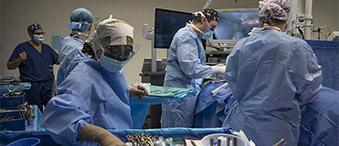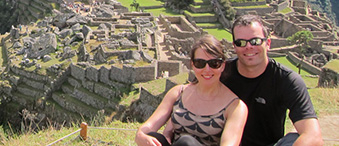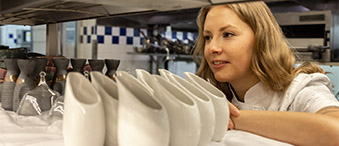It was March 7, 2018. Leata hadn’t seen Joellie in five weeks. She had been at CHEO, in Ottawa, with their 3-year-old daughter who needed dental surgery.
When they got home from the airport, Joellie said he wasn’t feeling well and went to bed. He woke with a fever. Leata called her aunt who wondered if he might be having a stroke.
“I called the nursing station and they said to bring him in. Our truck wasn’t working, so we took the Ski-Doo. He [Joellie] drove it to the nursing station,” said Leata. The nurses could see something was wrong and started calling doctors in Iqaluit who arranged for medevac from their northwest Baffin Island community.
Joellie lost consciousness at the nursing station. He didn’t come to until he arrived at the Qikiqtani General Hospital in Iqaluit where a he had a CT scan. The results were bad news.
7-hour surgery and 52 stitches
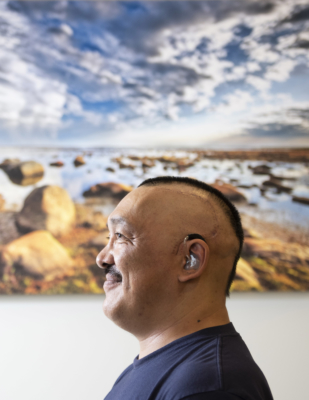
“First, the doctor told us that Joellie had a tumour, then they told us he had brain cancer,” said Leata.
She had only been home less than 48 hours when she found herself headed back to Ottawa. The Ottawa Hospital Cancer Centre, through an agreement with the Government of Nunavut, provides cancer services to residents of eastern Nunavut. Usually, only one family member or close friend accompanies a patient. The Qaunaqs knew that cancer treatment could be lengthy—weeks, even months. They prepared to leave family, friends, and their community support network for an undetermined amount of time while Joellie had treatment.
The couple, who’ve been married for 29 years, have four children. So before heading south, Leata arranged for their two youngest (13 and three years) to stay with their oldest son, whose wife was expecting a baby in April. It would be Joellie and Leata’s first grandchild, and they knew they would miss the baby’s birth.
Joellie had a seven-hour surgery to remove his brain tumour. He woke up with the left side of his head shaved and 52 stitches curving up from his ear to his temple.
“That’s not a kind of cancer that we cure”
“Joellie had a tumour called a glioblastoma—it is the most common kind of brain tumour that adults get,” said Dr. Garth Nicholas, Joellie’s medical oncologist. “It’s not a kind of cancer that we cure with our treatment. The goal is to try and keep that cancer from progressing, or worsening, for as long as we can.”
Glioblastoma multiforme is a deadly, extremely aggressive form of cancer that starts in the brain. Its tumour cells reach like tentacles into parts of the brain where neurosurgeons can’t see them and, therefore, can’t remove them.
- 1,000 Canadians are diagnosed with glioblastoma every year.
It affects 2 out of every 100,000 people.
Accounts for 12% of all tumours in the head.
- Affects more men than women.
Usually adults between 45 and 75 years of age.
Less than 10% survival rate, 5 years post-diagnosis.
- Tragically Hip lead singer Gord Downie and Ottawa politician Paul Dewar both died from this type of brain cancer.
New equipment and techniques could help outcomes.
Overcoming barriers of language and culture
In addition to hearing loss―a result of a life of hunting and being close to the sound of hunting rifles―Joellie spoke Inuktitut and had limited English. Understanding his diagnosis and treatment options was challenging. Fortunately, Leata was fluent in English and could be a strong advocate for his treatment. But this is not the case for many Inuit patients.
“I think challenges and the difficulties―above and beyond his brain tumour―were not related to Joellie’s tumour but to being far from home, and the language barrier,” said Dr. Nicholas.
Realizing these challenges. Dr. Nicholas referred the Qaunaqs to Carolyn Roberts, the First Nations, Inuit, and Métis Nurse Navigator for the hospital’s Indigenous Cancer Program. She helps many Inuit patients understand and navigate the health-care system throughout their cancer treatment.
“Our whole system of ethical practice has autonomy as its foundation stone. People can decide what they want to do and people are meant to be involved in what they want to do with their health. But the combination of language and education and cultural expectation makes it hard for people from the North to be involved,” said Dr. Nicholas. “That’s where the program with Carolyn is useful, because she helps get them around to the idea that this is not being done to you, but with you and for you.”
“When I meet patients, I tell them I’m a different kind of nurse,” said Carolyn. “I’m not here to just answer questions about cancer. I’m here for any question at all―doesn’t have to be about health. That’s the message I give to every patient.”
There are few similarities between Ottawa and the small Arctic communities where many Inuit patients live. Undergoing cancer treatment in a place that is so fundamentally different than their home takes a toll on patients and their mental health.
Connecting with someone’s culture and breaking down barriers with the universal language of compassion and laughter helps patients feel more comfortable and confident about going through their cancer journey.
“What we really worked towards is not to focus too much on the cancer. It brought us together, but that doesn’t define who they are.” –Carolyn Roberts, First Nations, Inuit, and Métis Nurse Navigator.
Dr. Nicholas said he sees the difference Carolyn and the Indigenous Cancer Program make for patients. “I can think of individual patients who would not have been treated and who would’ve just gone home. They were overwhelmed by everything and they would’ve just left but they dealt with Carolyn. They ended up staying and having some treatment, and the treatments were useful,” said Dr. Nicholas. “The program’s got measurable medical outcomes.”
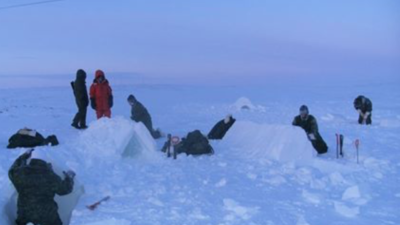
Back home, surrounded by family and friends
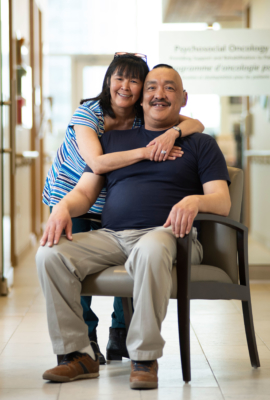
Joellie had his last radiation treatment in Ottawa on May 29, 2018. He was then discharged and eagerly headed home, back to Arctic Bay—to family and friends.
Dr. Nicholas’s follow up with Joellie and his treatment to help keep the cancer at bay continued. Every month, he would have blood work done and the results were faxed to Dr. Nicholas who then called Leata about whether Joellie could go ahead and take the chemotherapy pills he was prescribed to use at home. After Joellie finished the six-month chemo treatment, he had follow up CT scans that Dr. Nicholas received on his computer as if Joellie was a local patient.
Fortunately, Joellie was still relatively well when he went home last May and was able to enjoy time with his new granddaughter and family.
Glioblastoma is one cancer that always returns. And Joellie’s did. After almost a year since his discharge, Joellie’s health deteriorated and sadly, he passed away on May 5, 2019. He was cared for by people who loved him and his family beside him.
Thanks to donations from our generous community, researchers at The Ottawa Hospital have made tremendous breakthroughs in improving cancer treatments. It’s patients like Joellie who inspire our care givers and researchers to strive for a cure.
The Ottawa Hospital is a leading academic health, research, and learning hospital proudly affiliated with the University of Ottawa.


